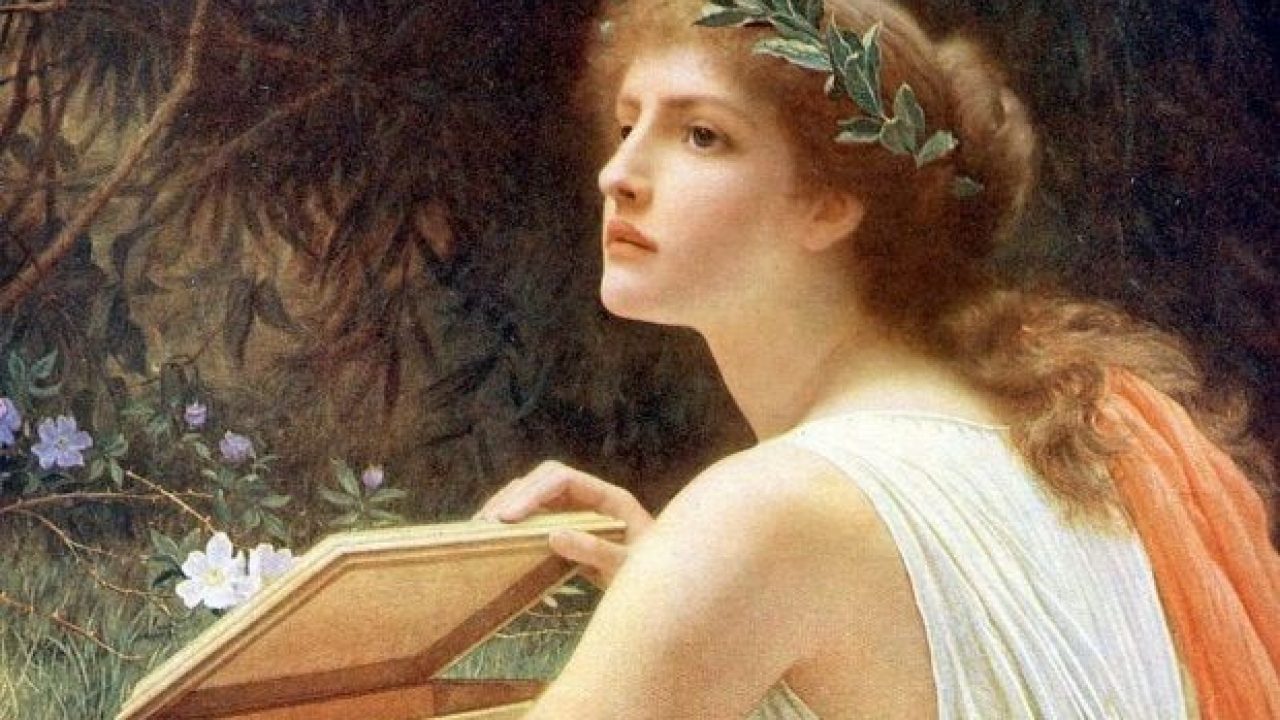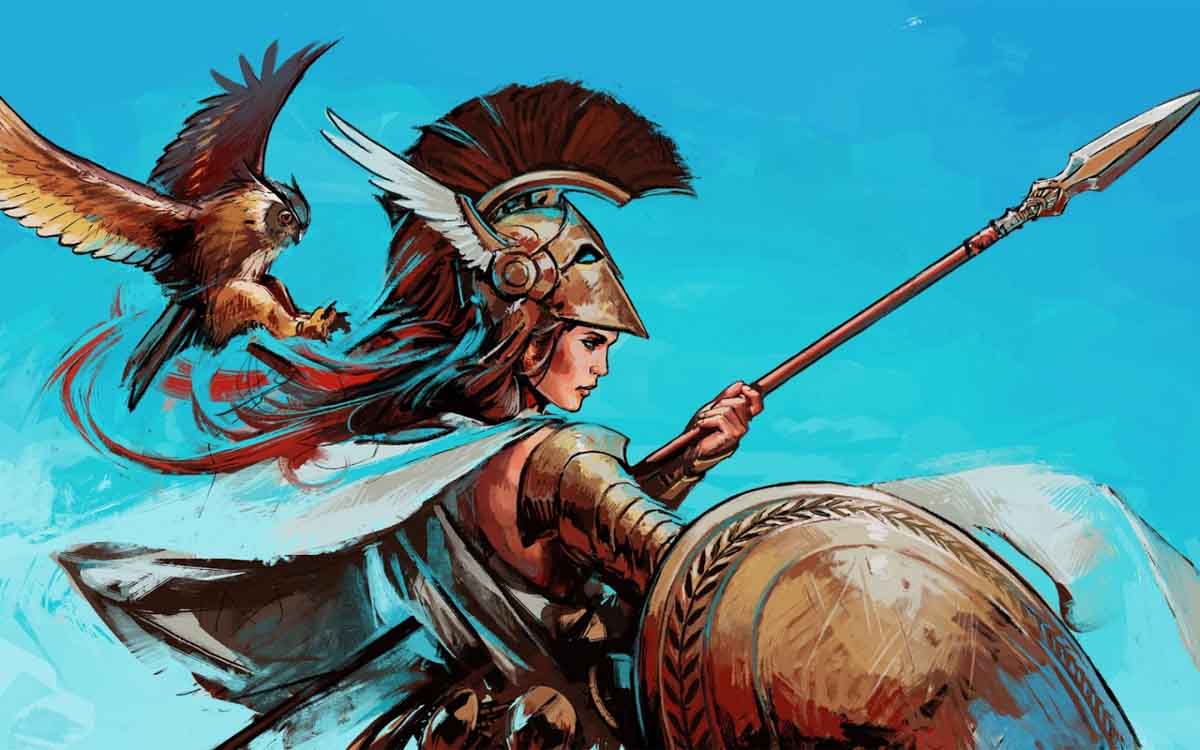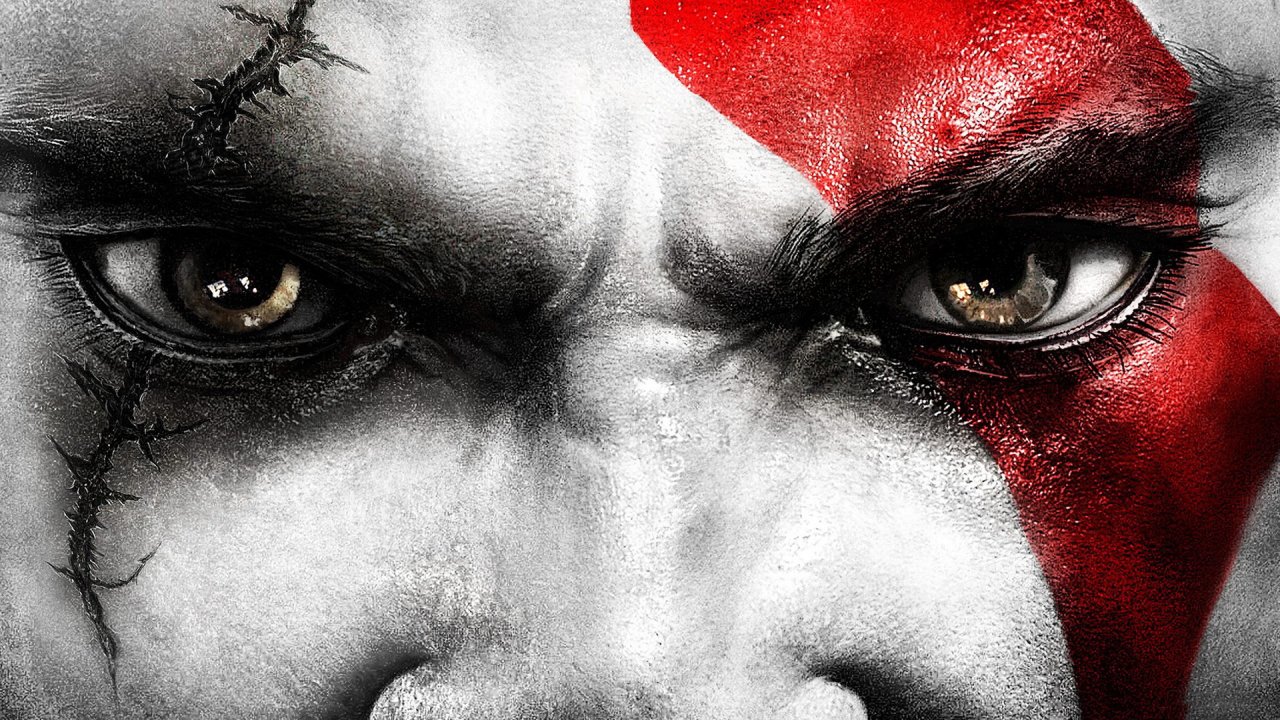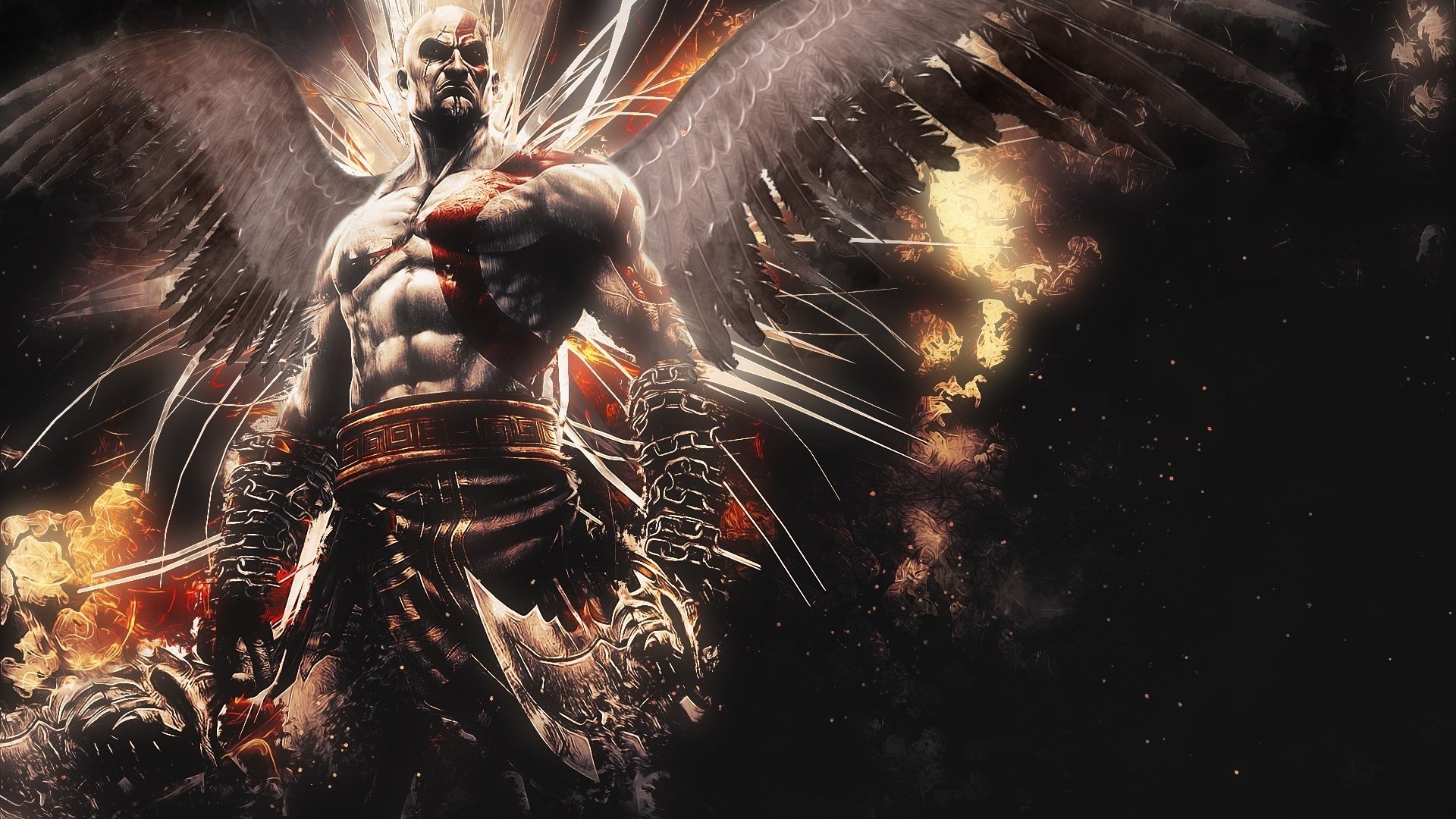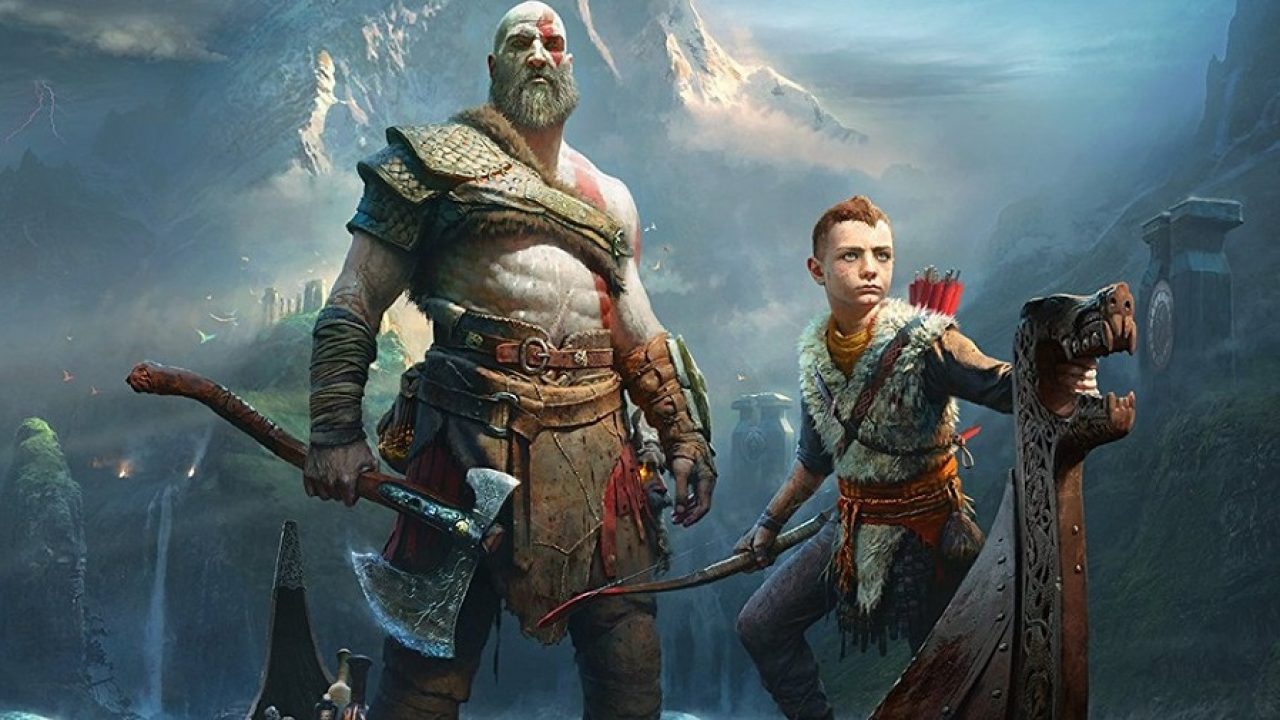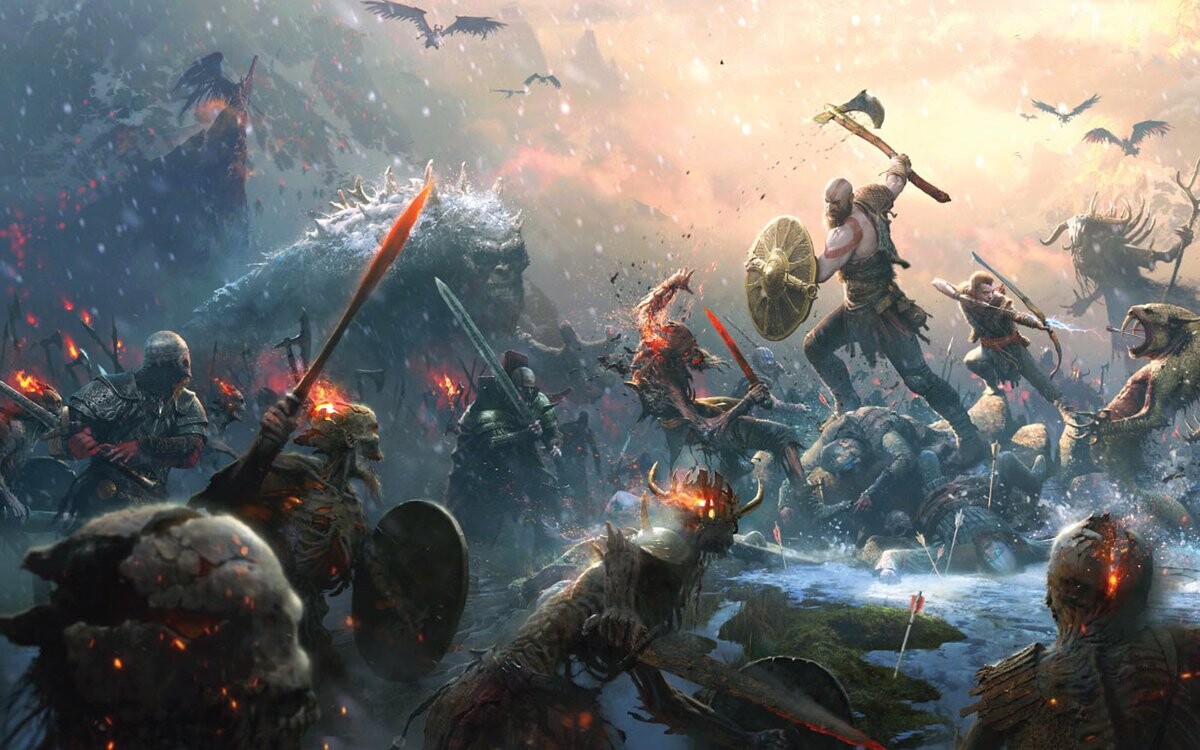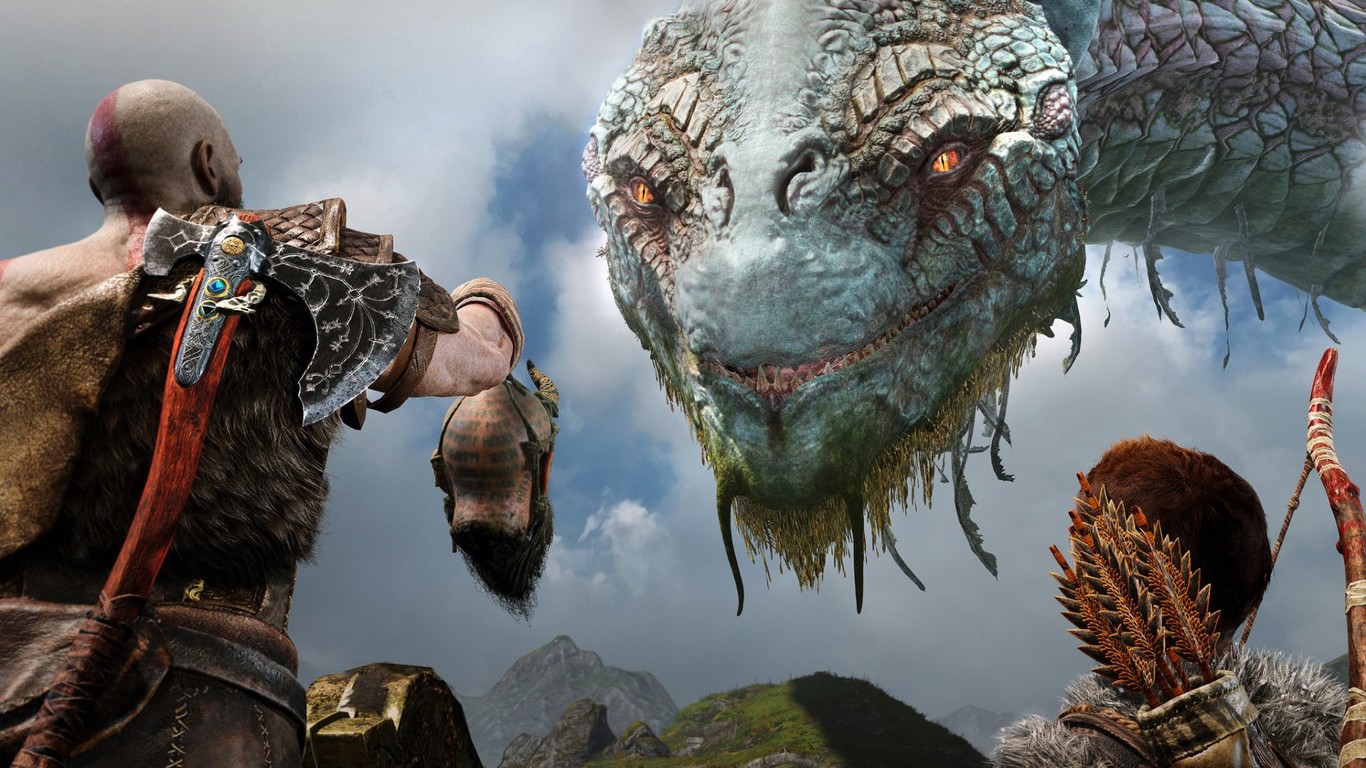It is widely accepted that he is a god of strength and power, but of Kratos in Greek mythology there are conflicting stories about just about everything else about him. There are two competing versions of his ancestry, each changing his relationship to the other gods.

Kratos in Greek mythology
In Greek mythology, Kratos (or Cratos) is the representation of the strength of the deities. He is the son of the Titan Pallas and his consort the Oceanid Styx (Styx). Kratos and his siblings Nike (or Nike the goddess of Victory), Bía (female personification of strength and violence) and Zelo (personification of fervour) are essentially personifications of a single character. Kratos and his siblings make their initial appearance in Greek mythology in Hesiod's Theogony.
According to Hesiod, Kratos and his siblings live with Zeus because their mother, Styx, was the first to go to the god to apply for a position in his regime, so he honored her and her children with high positions. Kratos along with his sister Bia appear in the first scene of the Aeschylus drama Prometheus Bound. Acting as agents of Zeus, they lead the captive Titan Prometheus onto the stage. Kratos forces Hephaestus, the kind-hearted blacksmith god, to chain Prometheus to a rock as punishment for stealing fire from him.
In Hesiod Kratos' Theogony it is simply seen as a personalized representation without further explanation or development. Hesiod explains that the reason the sons of Stygia were allowed to live with Zeus was because Zeus after the Titanomachy had decided to assign positions in his regime to those who did not occupy positions with Cronus. Since Styx attended Zeus first along with his children, Zeus honored them as one of the most important members of his new regime.
According to professor Diana Burton, Estigia, Zelo, Nike, Kratos and Bía, personify the voluntary actions that are the guarantee with which Zeus defeated the Titans. While the goddesses Diké (personification of Justice), Eunomia (personification of law) and Irene (personification of Peace) represent the qualities achieved by the regime of Zeus, Kratos and his brothers are the personification of the actions undertaken to achieve building that kingdom.
Appearance
With just a glance from his enemies, Kratos shakes them with terror and despair. Mythology tells how he got a terrible scar on his face. During the confrontation between the titans and the gods, his skull was shattered by a fragment of a mountain, but he managed to survive. Hephaestus, the divine blacksmith, with the help of special gold plates fastened his head back so that the warrior would still serve the Pantheon in future battles.
In appearance, the Titan has fierce features, a bald skull, and dark eyes. This image was recreated in-game based on the description in Aeschylus' poem "Prometheus Bound". Of course, the developers added a lot of details of their own, but generally speaking, the character and image were correctly conveyed in the project.
It is known for certain that Kratos in Greek mythology was born from the union of Pallas and Styx. Ancient Greek mythology says that his father was a minor Titan, and this status was inherited by him. His mother was an Oceanid, and she embodied the image of the most terrible underground river, which was crossed by dead souls on the way to Tartarus. It is because of her that the external features of a warrior seem so severe
Information about the years of his childhood and adolescence has not been preserved in history. Around the same period, Zeus was born from the union of Cronus and Gaia. When war broke out between the gods, his titan parents, Kratos in Greek mythology had to choose his side. Mythology says that the fighter sided with the gods and helped them in every possible way in an effort to overthrow his father.
The older titans were arrogant and feared for their throne even more than the later gods themselves. The war ended with the victory of Zeus, Hades and Poseidon, not without the help of other fabulous creatures. Kratos in Greek mythology became a loyal ally of the head of the Pantheon and began to serve. Judging by the armament of him and the prototype of the game, the fighter was sent only for military affairs and the resolution of various kinds of conflicts.
Kratos and Zeus
In ancient Greece, there were several anthropogonic myths that sometimes contradicted each other. According to the most widespread version, humanity was created and exterminated several times. The result, for one reason or another, evidently did not please Zeus. He couldn't get attached to his creatures to keep them alive (perhaps he just wanted to retain the power, like his predecessors). Once again, the cause of the genocide was the desire of his cousin Prometheus to put a person on the path of progress (through mastery of fire).
Wishing to punish humanity and spite his cousin, Zeus orders Hephaestus, Aphrodite, and Athena to create a woman named Pandora. She thus she was made in clay and water by Hephaestus; Athena then gave her life, taught her manual skills she taught her, among other things, the art of weaving and dressed her; Aphrodite gave her beauty; Apollo gave him musical talent; Hermes taught him lies and the art of persuasion and made him curious; finally Hera made him jealous.
Pandora was presented as a wife to Prometheus's younger brother Epimetheus, who, despite his elder brother's prohibition, was forced to accept a gift from the supreme god. Pandora brought in her luggage a mysterious box that Zeus forbade her to open. It contained all the ills of humanity, including old age, disease, war, famine, misery, madness, vice, deceit, passion, pride, and hope.
Once installed as wife, Pandora gave in to the curiosity Hermes had given her and opened the box, thus releasing the evils it contained. She wanted to close the box to hold them; But it was too late. Only hope, slower to react, remained locked there. As time passed, Pandora and Epimetheus already had an adult daughter who married Prometheus's son Deucalion. Not without the help of Prometheus, the couple escaped the Flood and became the founders of a new humanity.
Zeus couldn't do anything about it. He had his cousin chained to a rock in the Caucasus Mountains, where an eagle would fly by every day and peck at his liver (but that's a slightly different story). Meanwhile, the number of people grew and progressed, often undermining the divine foundations. However, the Olympians found a way to subjugate a person, through religion, and such coexistence became beneficial to both celestials and mortals.
Zeus tried in every possible way to prevent his defeat. First of all, he enlisted the support of the Moirae, the goddesses of destiny. The old spinners warned him more than once against unwanted connections. She so happened that Zeus had to eat Metis, pregnant with him, so that she would not give birth to a son. Soon the supreme god began to suffer from terrible headaches and asked Hephaestus to open his skull. From the skull came Athena, the goddess of wisdom and war. Despite her strength and belligerence, the daughter of Zeus was always loyal to her.
Not everything is so clear with Hercules, because there are many mythological speculations about the most famous hero. It is known for certain that Hercules helped prevent the overthrow of the Olympians when the gigantomachy occurred. Gaia, the ancestor of the gods, decided that the power of her grandchildren was over. And, as always, she was stern, but fair: the Olympians forgot their other giant children for a long time, and besides, the sufferings of the titans who were thrown into Tartarus tormented Gaia.
The giants attacked the gods, but they fought back, largely thanks to Hercules. The latter can be considered the most powerful creature, but despite this, he was not going to encroach on power, since he was not that ambitious. Hercules, by the way, became one of the prototypes of Kratos himself. And it is even more interesting that the collision of Kratos and Hercules became inevitable in the third part, because there should have been only one "Hercules".
The last time Zeus experienced the prophecy was when he wanted to marry the goddess Thetis. According to one version, Prometheus dissuaded his cousin from him in time. And after long intrigues, Thetis was forced to marry Peleus, king of the Myrmidons, and give him Achilles. Thus, another threat to Zeus was averted. Achilles became the strongest man of his time (Hercules had risen to the gods by this time), but he was destined to die at the end of the Trojan War. Like Hercules, Achilles became one of Kratos' prototypes.
Kratos in Greek mythology is one of the Titans who joined the Olympian gods during the Titanomachy, led by Zeus. This character is much less well known than, for example, his sister Nike, the winged goddess of victory. However, Kratos in Greek mythology played an important role in the first (and not only) periods of the reign of Zeus, which was reflected in the epic of Ancient Greece. Kratos first appears in Hesiod's Theogony. Its Greek name Κράτος is understood as "strength, power".
He is the youngest titan, the son of the Oceanid Styx (the river goddess of the underworld the Styx) and the titan Pallas, as well as the brother of Nike, Bia and Zelo. He can be characterized as an executioner and loyal servant of Zeus, who unquestioningly and zealously carries out the orders of the king of the gods; in other words, this is a representative of the executive power, police. In fact, he is a personification of power, that is, physical retribution.
Kratos and Prometheus
Kratos in Greek mythology appears almost as a key character in Aeschylus' "Prometheus Bound", where he leads the process of punishing Prometheus. Also, Kratos is so bold, strong, and domineering that he orders the meek god of fire, Hephaestus, to chain the titan, who intercedes for the people. The controversy of the titan with Hephaestus and Prometheus himself is interesting, where the cynical essence of the servant of Zeus is manifested.
Seeing Hephaestus show his sorrow for the unfortunate Prometheus' suffering, Kratos taunts him, saying that pity is meaningless and identifies the rule of law with the rule of fear. Hephaestus replies that Zeus is despotic, to which Kratos agrees and justifies by adding that justice is a system in Zeus's cosmic hierarchy, which decides who and how to pay. And no one is free from divine justice, except Zeus himself.
Once Prometheus is chained, Hephaestus, Bia and Kratos leave. Finally, Kratos turns to Prometheus and mockingly tells him that he is not worthy of his name (meaning "prudent"). This speech of the titan is deeply engraved in the reading and well illustrates a system that has not essentially changed over the millennia: until now, the law can convict a person who has committed a crime with good intentions.
Kratos in God of War
With the influx of popularity of the God of War series of computer games, fans became more interested in who the main character was, named Kratos. Kratos in Greek mythology is rarely mentioned, and only a few facts indicate his existence and place among all personalities. This fierce warrior was not in vain chosen as the hero of the game, because Zeus himself recognized his fighting character and his abilities.
The developers of the God of War game in the project created their own vision of who Kratos is in Greek mythology and what his role is in all the stories. At the beginning of the plot, the warrior was a Spartan commander, battle-hardened and loyal to his late brother Deimos. In one of the battles, his army was close to being crushed by his enemies, so Kratos summoned the god of war Ares. The god granted her grace from him and demanded her life and soul from him in exchange for victory and incredible strength.
After that, with the donated swords of Chaos, the fighter repeatedly sowed devastation throughout the territory of a large country. One day, Ares decided to hurt Kratos and forced him to kill his family, including his daughter. After this, the furious Spartan swore revenge. From that moment on, he began his long journey to Olympus, where he was able to take revenge on all the gods.
Kratos also takes the ashes of his family and passes them all over his body, leaving it completely whitish, hence he is known as the "Ghost of Sparta" and for ten years of his life, totally tormented by terrible nightmares, he served the other gods. olympic Tired of serving so many, he seeks out Athena and she tells him that if he realizes what his last mission would be, the task of assassinating Ares, he will be forgiven for the murder of his family, Athena passed this mission on to Kratos because Zeus He had forbidden to have divine action.
More than once, adventures led him along his chosen path in the service of Zeus, saving the people of Greece from Morpheus, battles in the underworld, and many other battles. Finally, he managed to reach Olympus and achieved the intended revenge on him. This huge story is described in three parts of the game series, the developers plan to continue the adventures of Kratos, but in a different setting.
There is a clear similarity between Kratos in Greek mythology and Kratos from God of War, both are characters with deeply scripted drama and a disposition to cruelty, personalities in the service of the supreme god. But, interestingly, this similarity is not a borrowing or imitation, but simply a "happy coincidence", as one of the creators, Stig Asmussen, put it.
He also pointed out that both Kratos were pawns of the supreme god, but the Kratos in Greek mythology remained faithful to Zeus until the end, instead the Kratos of the game, as is known, turned against him. Another difference is the attitude towards Prometheus: Kratos in Greek mythology chains the titan, and the game, on the contrary, releases him (God of War II). Also, while inventing Kratos for God of War, game designer David Yaffe was given the task of drawing the concept of a tough anti-hero who embodies unbridled power.
The first part of the franchise, released in 2005 on PS2, immediately introduced Kratos as a tragic hero. Sylvia Chmielewski, in Antiquity in Popular Literature and Culture, says that he is a Herculean antihero who, because of his sins, has fallen into the service of the gods. Like Hercules, Kratos falls into madness and kills his own family, in addition, in the game Ares sends cloudiness, for which, in fact, he pays with his life at the end of the first part.
The hero gained the ability to kill a god thanks to Athena, the goddess of a just war, who suggested that he would find strength in Pandora's Box. Kratos himself is originally the commander of the Spartan army. And this is one of the first licenses of spartophilia in pop culture: literally a couple of years after the release of the game, the Zack Snyder movie «300 Spartans» will be released, the adaptation of the Frank Miller comic strip « 300» from 1998. It is very possible that Kratos also absorbed the image of the Spartan king Leonidas.
Two years later, in 2007, the second part of "God of War" was released. After killing Ares, Kratos himself reigned as the god of war. He develops a close relationship with Athena, the goddess of wisdom, who asks to be more careful not to obey Zeus when he orders an attack on the island of Rhodes. Soon Zeus begins plotting against Kratos. Having received the Colossus of Rhodes, the supreme god forces him to fight Kratos, convincing the latter to conclude his power in the Blade of Olympus.
This weakens the hero, making him human. In the end, Kratos defeated Colossus, but was mortally wounded. He rejects allegiance to Zeus, so he kills the hero. It is noteworthy that, having arrived in Hades after death, Kratos fights with Typhon, the descendant of Gaea, who, according to mythology, was supposed to become the slayer of the gods. That is, Typhoon is also one of Kratos' prototypes.
The hero overcomes the path from Hades to Olympus, killing an entire galaxy from the ancient bestiary, simultaneously killing Prometheus out of compassion. With this, he releases the Titans from Tartarus and leads them to destroy the gods. In the second part, Kratos learns from Athena that Zeus didn't just want to get rid of him. The prophecy says that the son of Zeus will destroy the Olympians. Kratos wants to kill the God, but Athena saves her father by sacrificing herself.
In 2010, half of the first and second parts of "God of War: Ghost of Sparta" were released, which tells the story of Kratos unraveling the secrets of his origin. Some features and background of the plot are revealed here. For example, Kratos had a twin brother, Deimos, who was mistakenly taken by Athena and Ares, thinking he was the destroyer of the gods. After the journey associated with the death of Atlantis, Kratos embarks on the path of revenge against the Olympians.
Ghost of Sparta stands out for the fact that it reflects the myth of the twins. It can be assumed that in this case the prototypes of Deimos and Kratos were the Spartan twin princes Euryphon and Agis. In 2010, the long-awaited finale of the epic game about the destroyer of the gods «God of War III» was released. The plot is not too twisted: Kratos has to destroy gods, titans and other mythical creatures one after another before reaching Zeus and Gaea.
From a plot point of view, it is the final battle that is interesting, where the main intrigue of all parts of the game is revealed. It turns out that from the very beginning, Athena was Kratos' instigator and manipulator. After opening Pandora's Box, she not only received the power of the godslayer, but she also infected the Olympians with negative energy.
According to Athena herself, she, as the goddess of a just war, foresaw the darkness that lurked in the hearts of the Olympians, therefore, initially, when the Box of Misfortunes was created, Athena secretly put Hope, the only bright quality there. And Hope came to Kratos. Now Athena demands that Kratos return it to her. But the Spartan, fed up with the fact that he was constantly manipulated, refuses and sacrifices himself, so La Esperanza does not address Athena, but humanity.
In conclusion, the creators of the franchise have done their best, having made not only an intense game of high quality, but also an epic worthy of the pen of ancient authors with deep drama and moral values. It's no wonder that eight years later, Kratos took a new breath and went to perpetrate Ragnarok in the wake of the popularity of the Scandinavian theme. Not to mention the fact that he became the father of the most famous destroyer of gods in mythology. But that is another story.
The next part of the epic saga about the adventures of a brutal warrior in the world of the gods, released on April 20, 2018, aroused unprecedented interest from gamers: they either praise it or find fault with it, but one thing is clear. can say: the game did not leave anyone indifferent and therefore worthy of consideration. The dark sides of mythology do not usually delight fans with their presence in the sphere of the game, but it is here that the entire scenario is based on them.
Sunny Greece for the ferocious giant Kratos clearly didn't work out: he was enslaved, tricked, and forced to kill his family. In response, the sullen bearded man blasted the ancient Greek pantheon and turned Olympus to crumbs. And since the death of the gods in the mythology of the Hellenes is not even discussed, it can be concluded that all legends and traditions flew to the Tatars, already non-existent.
So now, determined to put this bloody anarchy behind him, Kratos heads to the harsh Scandinavian landscapes, along with his son Atreus, to scatter the ashes of the child's mother from the highest mountain in the nine worlds.
If the ancient Greek gods counted on immortality, the Scandinavians, on the contrary, were ready to die and continue their life after death until the last battle in the world - Ragnarok. For this, the Vikings had as many as three more worlds: Helheim - for those who did not die in battle, and Valhalla and Folkwang - for brave warriors who, even after death, prepare for the rebirth of light. But this is it: life after death, knowledge available only in legends.
In the game we will see that Kratos burns the body of his ex-wife on a funeral pyre, performing a farewell ritual. And this is true: the Scandinavians did not distinguish between men and women and gave them honors in the same way. The question arises as to why it was necessary to burn people who were directly connected to water and cold throughout their lives.
As the legends say, Odin himself decreed that all the dead should be burned along with their properties, because exactly what was at stake will be used by the dead in the afterlife. In addition, there are references to a kind of baptism of fire: it was believed that burning can cleanse the soul of the deceased. But Kratos' main goal, scattering his wife's ashes from the highest mountain, doesn't seem entirely believable.
The ashes of the deceased, according to the rules, should have been thrown into the sea or buried in the ground, building a mound around it. If these rules were not followed, the body would not be able to rest and find its way to the next world. He would then become a revenant, an appearance of a banshee (female spirit) in Celtic mythology, a spirit that brings misfortune to members of his family, or a draugar, a fully combat-ready corpse.
Here we come to another aspect of the game: sinister opponents, draugras and their appearance in this world. The game says that the dead can remain restless not only because of the wrong ritual, but also because of the use of special magic - seid. Seid was a special magical practice, one of several components of true and complete Scandinavian magic.
Furthermore, if the first (theoretical) parts were honorable and brilliant, then the seid, the applied part, was associated with the darker sides of the magician's soul. Even Odin, almost the only man who practiced seid (traditionally it was a purely female affair), needed this magic to attack his enemies. But in reality and in the game there is one main difference: in «God of War» the seid serves to revive the dead, but in reality the magic comes to life, absorbing force and energy.
It must be admitted that the most successful game projects in recent years have been games with a well-developed plot and psychological dynamics of the characters and, perhaps, this indicates the emergence of a separate layer of culture, combining literature, cinema and the game itself in interactive form. This is so in Last Of Us and in Hellblade: Sena's Sacrifice, and now in God of War.
For thirteen years, the game has evolved from an ordinary slasher to a complex action movie, the main highlight of which is not only the interiors of places rich in dark myths, but also no less dark mental labyrinths. Technically, we won't see anything new: the gameplay is based on standard dialogues between father and son, with the addition of trendy head voices (and this technique is clearly borrowed from Hellblade: Sena's Sacrifice). The dynamics of the character will be visible only due to the detailed study of the plot.
At first, it seems that the game only surprises Kratos: compared to the stereotypical assassin berserker (Viking warrior), the new God of War has become a person: a stern but fair father, willing to do anything to save his brother. your child (and hide it carefully). Kratos finally became sentient: we see pain for his wife, fear for Atreus.
It can be seen that the darkness and hatred that he was immersed in in the previous parts of the game began to recede. And here the main surprise is in the change of Atreus filling his soul with darkness. It is not often that a secondary character becomes the main character, and this is what the developers managed to do. In a sense, all the way up the mountain is his growth, initiation, transformation from a little boy to, if not an adult, then a man who can stand up for himself.
Atreus grows and at the same time his soul darkens. He seems to absorb lies, cunning, deception, and betrayal. It is then that two apparently distant links are connected: the name given by the father, and the name given to him by the giants. The question remains: where does the soul go when you become a god?
If we consider the plot of the game globally, then the journey of Kratos and Atreus is their path to Death. This allegory has many meanings. First of all, Jotunheim, the land of the giants, really represents the land of the dead: the bodies of missing people dot the land, forming mountain ranges.
Second, the path to Jotunheim is the path to predestination, a state that opens after death, when a person's life flashes before their eyes. And finally, the path to the highest peak of the nine worlds marks the path to the end of the world, Ragnarok, the Last Judgment, to the point of no return, which cannot be avoided. Death is another main character in God of War.
The idea of using Norse mythology is not new at all. This can be seen in small indie games as well as giants like Hellblade: Sena's Sacrifice and Skyrim. Even if the gameplay (combat and character leveling) doesn't surprise with anything particularly new, Atreus' help in fierce battles can't be compared to the ever-slowing huscarls. And Alvheim overcomes the atmosphere of Senua's gloomy world.
The game stands out for the number of mythological characters interpreted, the number of worlds and the closeness to the original Scandinavian stories. Let's add a difficult psychology and decorate with an unexpected ending, and we will get a very high-quality product with an application for a sequel. In all aspects, the new God of War wins in the best interpretation of Norse mythology.
In general, God of War is a compendium of information for the lover of the mythology of the northern countries. Together with Kratos, who does not understand the runes and is not at all versed in the legends of the Vikings, from the mouth of Atreus, we learn about the origin of the world and its end, about the nine worlds and their inhabitants. The developers approached this aspect of the game responsibly.
It wasn't without minor inconsistencies, though: for example, no matter how hard you try, it's impossible to get into any of the nine designated worlds in God of War even after the ending, which can cause some disappointment; after all, this adventure is very addictive. Of course, it's a shame at first, but don't forget that Asgard, for example, is the world of the overgods, and strangers won't be allowed there just like that.
So, if the very concept of the plot - a long and thorny path to the intended goal - is old, like Midgard, and beaten like Balder. For an interesting plot without special mistakes, the immersion in the dark Scandinavian mythology and the truly dark allegories of God of War will be worth your attention.
Here are some links of interest:

